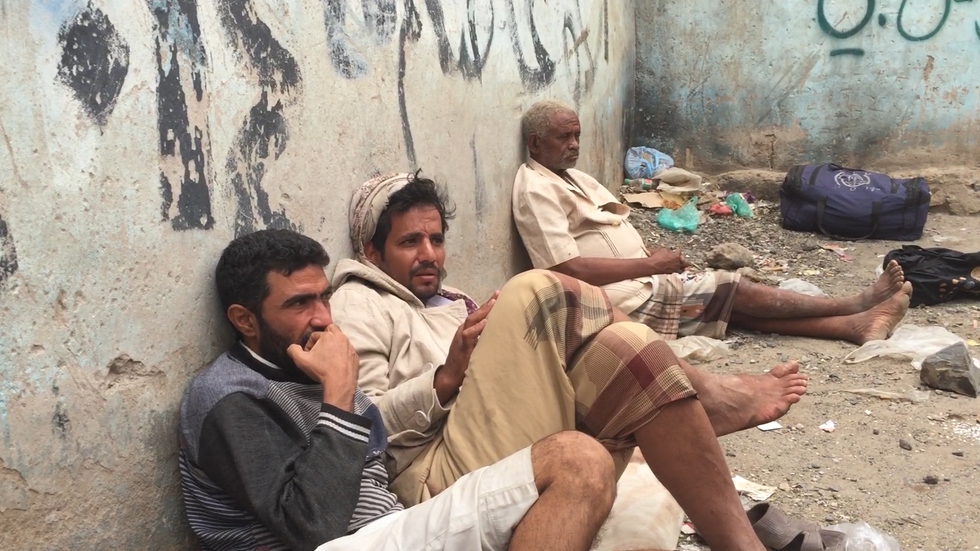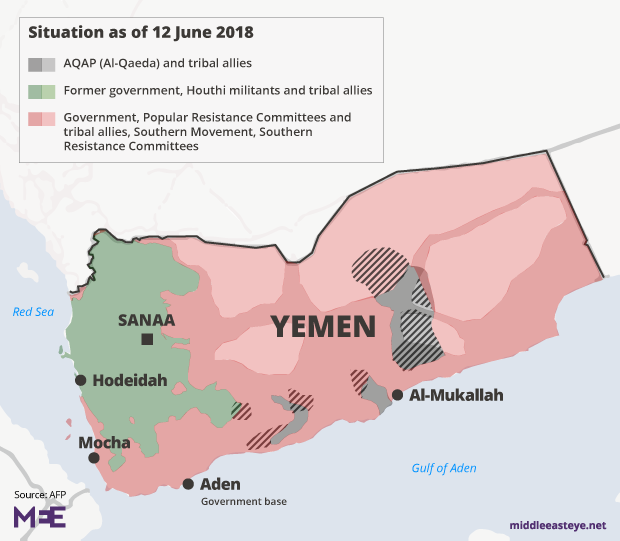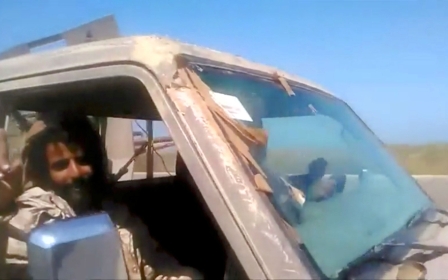'We cannot bear more suffering': Displaced from Hodeidah spill into Sanaa's streets

SANAA - Outside Abu-Bakr al-Sideeq School in the Yemeni capital Sanaa sleep dozens of people.
They are residents of Hodeidah, displaced by a pro-government forces assault on the Red Sea port city. Now, they wait to be approved entry to the school, which has recently been transformed into a camp to receive the fleeing Yemenis.
The camp's guards prevent anyone entering without permission from its supervisors, but with the school already full, the supervisors can only note the names of the displaced people and are unable to help them further.
Omar Ahmed Ibrahim, a 44-year-old father of six, left his home near Ghulail Market in Hodeidah on 20 June after the battles reached his neighbourhood.
Like many people, he took his clothes and nothing else.
We fled the neighbourhood in groups, walking on foot, as the roads were already blocked because of the battles
- Omar Ahmed Ibrahim, Hodeidah resident
"Three Houthi tanks beside my house were targeting the [pro-Yemeni government] forces, and the air strikes targeted the Houthis near our neighbourhood, so the house was shaking," Ibrahim told Middle East Eye.
Ibrahim used to work as a labourer in the fish market, and he did not have money for transportation or opportunity to make a livelihood away from his home, but when the war approached his neighbourhood, he only thought how to keep his family safe.
"When I heard the bombing, I did not think about money, and we fled the neighbourhood in groups walking on foot, as the roads were already blocked because of the battles," he said.
"When we arrived to the Kilo 16 area, there were some buses that took us to Sanaa for free," he said. "That was the good news, that I got a free bus from Hodeidah to Sanaa."
Bussing in
The assault on Hodeidah is being conducted by a collection of Yemeni factions backed by foreign mercenaries, Emirati ground forces, and UAE and Saudi aircraft and battleships.
Some 30,000 people have been displaced so far, with another 600,000 people still residing in the port city, where Houthi rebels are digging in, preparing for protracted street-to-street battles.
"The conflict continues to displace people within their own districts and to neighbouring governorates including Sanaa, Dhamar and Ibb; some using their own vehicles and others public transport," the United Nations Office for the Coordination of Humanitarian Affairs (OCHA) said last week.
Even fleeing the battle is dangerous for Yemenis.The Houthis have scattered landmines across Hodeidah’s outskirts, and pro-Houthi media have reported that a coalition air strike hit a bus carrying displaced people fleeing the city towards Taiz.
Ibrahim said he felt he was in a safe area when he rode the bus, but he was not aware that new suffering would begin on arriving in Sanaa.
"We arrived to Sanaa by sunset. The bus left us in the street, where we slept the first night," he said.
"The next day a philanthropist took us to his house, and we stayed there for four days. After that he asked us to leave his house and look for shelter in Abu-Bakr al-Sideeq camp."
I have slept in the street for four days together with my family
- Omar Ahmed Ibrahim, Hodeidah resident
The camp has been set up by the Houthi rebels controlling the Yemeni capital. The supervisors and guards are all members of the rebel group.
Ibrahim, his wife and six children sleep behind Abu-Bakr al-Sideeq camp, waiting for supervisors to accept them.
"I have slept in the street for four days together with my family," he said. "I registered my name with the camp supervisors but they told me that the camp is full and they cannot accept new people, so they are preparing a new school to be a camp."
Insufficient camps
Hasan Mohammed, a 41-year-old displaced person, left his house near Hodeidah airport, the scene of fierce early fighting, on 20 June and stayed five days in the port city.
Like Ibrahim, he then took a bus to Sanaa and now sleeps beside the camp with his family.
"The bus brought us to this camp, but the supervisors have not accepted us because the camp is full,” Mohammed told MEE. "But they promised us to open new camps."
The displaced people inside and outside the camp receive daily meals. Lunch consists of rice, yogurt and bread, while breakfast and dinner consist of bread and beans.
"We can receive food here, but we will not get it somewhere else, so we will wait here until we get shelter," Mohammed said.
Dozens of families outside the camp dream to enter it, but displaced people on the inside are also not satisfied with their situation because of overcrowding.
"We receive daily food in the camp, but the camp is full of people, with more than one family living in the same room," a displaced man who entered the camp six days ago told MEE on condition of anonymity.
The supervisors prevent displaced people in the camp from speaking to the media.
The man spoke to MEE outside the camp as he was going to buy medicine for his daughter, who suffers from headaches, and he said that the supervisors do not allow them to leave the camp at will.
"If we need to leave the camp we have to coordinate with the supervisors, or the guards will not allow us to leave," he said.
"This is the camp's system, and we cannot oppose it. But we hope that officials open new camps to reduce the number of people in this camp."
Regarding the work of international humanitarian organisations in the camp, the man said that some aid workers had come to the camp and taken the displaced people's details. However, he said the displaced have not yet received any aid from them.
Taking responsibility
Some activists have accused the Houthi supervisors of the camp of mistreating the displaced people, saying they have not provided them with proper food and they do not allow them to leave the camp to buy qat, a narcotic stimulant leaf popularly chewed in the country.
"The displaced people in Sanaa prefer to return to Hodeidah than live under the supervisors’ mistreatment, as the missiles have more mercy upon them than life in the camps," Yemeni journalist and the editor-in-chief of al-Hodeidah News website Ghamdan Abu Ali said in a post on Facebook.
'The displaced people eat food that dogs cannot eat'
- Ghamdan Abu Ali, Yemeni journalist
"The displaced people eat food that dogs cannot eat, they receive only rice and yogurt as lunch, without meat, chicken or fish, and they eat beans for breakfast. The supervisors prevent the displaced people from leaving the camp to buy qat, as if they are in the central prison."
Social activist Mohammed Gaber, who helps displaced people with transportation, told MEE: "The Houthis cannot do anything for the displaced people, while the international organizations are still making arrangements to work with the displaced people, and they may begin soon."
Suze van Meegan, protection and advocacy adviser at the Norwegian Refugee Council, told MEE ahead of the Hodeidah assault that humanitarian organisations were not equipped to deal with the looming crisis.
"The scale of needs could overwhelm humanitarian organisations – we are already struggling to keep pace with needs across the country," she said.
Some 22 million people in Yemen require food aid, with at least eight million on the brink of famine. The UN says Yemen is suffering the world's worst humanitarian crisis.
As displacement continues, humanitarian organisations have scaled up coordinated assistance to affected people in all areas hosting displaced families, including rapid-response packages that contain ready-to-eat food rations and other essential items.
However, in some districts the fighting is limiting access to displaced people, according to OCHA.
Ibrahim said he was shocked to see how many displaced people were suffering in Sanaa and the lack of organizations preparing camps for all those flooding into the city.
"Shelters and food are the main needs of displaced people, and I hope that organizations can open new camps as soon as possible," he said.
"We cannot bear more suffering in the streets."
This article is available in French on Middle East Eye French edition.
Stay informed with MEE's newsletters
Sign up to get the latest alerts, insights and analysis, starting with Turkey Unpacked
Middle East Eye delivers independent and unrivalled coverage and analysis of the Middle East, North Africa and beyond. To learn more about republishing this content and the associated fees, please fill out this form. More about MEE can be found here.







